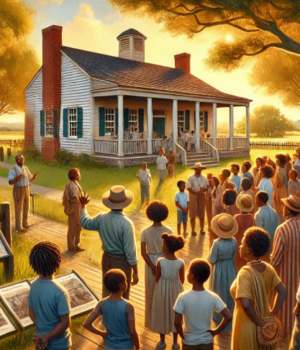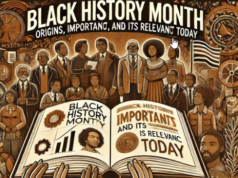# Federal Grant Advances African American History Preservation in Chesapeake Region
The Chesapeake region, rich in history and cultural significance, is receiving a significant boost in its efforts to preserve African American heritage. A newly announced federal grant aims to highlight and safeguard the often-overlooked contributions of African Americans in shaping the history and identity of this region. This initiative not only restores historical sites but also rekindles stories that deserve to be at the forefront of American history.
From the struggles of enslaved individuals to the achievements of African American leaders and communities, the Chesapeake region holds a plethora of stories that must be uncovered, cherished, and shared.
—
## Understanding the Importance of African American History in the Chesapeake Region
The Chesapeake Bay area, encompassing parts of Virginia, Maryland, and nearby states, has been a historical hub since the early colonial era. For centuries, African Americans have played a central role in the region’s development. From laboring on plantations to leading Civil Rights movements, they have left an indelible mark.
But why focus on preserving African American history specifically?
1. Filling Historical Gaps:
Many traditional narratives have historically omitted the contributions of African Americans. Preserving these stories helps to fill gaps and offer a more comprehensive view of history.
2. Recognizing Local Connections:
From Harriet Tubman’s escape routes on the Eastern Shore of Maryland to the thriving African American communities in urban centers like Baltimore, the Chesapeake region brims with local stories of resilience, ingenuity, and leadership.
3. Education for Future Generations:
Preserving historical sites and narratives allows future generations to learn directly from preserved artifacts, oral histories, and physical spaces tied to critical events and milestones.
—
## Details of the Federal Grant
This much-needed federal grant will provide funding to assist in the identification, restoration, and elevation of important African American historical sites throughout the Chesapeake region. Specialists, local historians, and community organizations will collaborate to determine how best to utilize the funds. Here’s a breakdown of what this grant is expected to accomplish:
- Site Restoration: Many African American historical sites have fallen into disrepair or face threats from urban development and environmental changes.
- Oral History Projects: Collecting oral histories from descendants and locals to preserve the lived experiences of African Americans in the region.
- Archiving Historical Documents: Documents such as property records, personal letters, and community meeting notes are vital to constructing a fuller picture of past events.
- Improved Accessibility: Ensuring historical sites are accessible to the public through physical renovations, informative exhibits, and digital archives.
—
## Spotlight on Key Sites in the Chesapeake Region
The Chesapeake region is home to numerous landmarks that tell the stories of African American resilience, struggle, and achievement. Some of these sites are already receiving attention under the grant initiative:
### Harriet Tubman Underground Railroad Byway (Maryland)
Harriet Tubman, a hero of the Underground Railroad, was born in Maryland and orchestrated numerous daring escapes to bring enslaved people to freedom. The Underground Railroad Byway, which includes the Harriet Tubman Underground Railroad Visitor Center and several historical markers, is expected to benefit from the additional funding.
### Fort Monroe (Virginia)
Known as “Freedom’s Fortress,” Fort Monroe played a pivotal role during the Civil War. It was here that enslaved individuals sought refuge under the Union Army, triggering the historic “Contraband Decision” that altered the course of the war.
### The Frederick Douglass Narrative (Maryland)
Born into slavery on the Eastern Shore of Maryland, Frederick Douglass became one of the most prominent abolitionists, orators, and authors of the 19th century. The sites associated with his upbringing and story may also see preservation efforts under this initiative.
—
## Local Communities Rally Around Historic Preservation
At the heart of this project are the local communities deeply invested in preserving their history. Community members, activists, and historians have long championed greater awareness of African American contributions to the Chesapeake region. This federal grant serves as a validation and amplification of the decades of work already done.
Collaborative Efforts:
Projects rooted in the community foster a sense of ownership and pride. By combining local expertise with federal funding, the initiative ensures that the preservation efforts are inclusive, respectful, and impactful.
Empowering Education:
Part of the plan involves building educational programs around these preservation efforts. Community members envision workshops, guided tours, and curriculum enrichment for local schools to make this history more accessible to young learners.
—
## The Broader Impact of This Initiative
This federal initiative in the Chesapeake region is part of a larger nationwide effort to highlight African American history. Across the United States, historical organizations are recognizing the untold role of African Americans in founding and building America.
Here’s why this matters:
- Representation Matters: By prioritizing African American history, these projects ensure that legacies of underrepresented groups are recognized and celebrated.
- Tourism & Economic Growth: Preserving and promoting historical sites attracts tourism, contributes to local economies, and creates jobs in preservation, education, and hospitality sectors.
- Cultural Healing: Acknowledging past injustices through history can help foster dialogue, healing, and unity within communities.
—
## A Call to Action for the Public
As this preservation project gets underway, there are countless ways for individuals to play a role in making it a success. Here are a few ways to get involved:
- Volunteer: Many historic sites rely on volunteers to help with research, cleaning, tours, and events.
- Donate: While the grant provides critical funding, private donations can supplement resources for larger-scale projects.
- Learn and Share: Educate yourself on the African American history of the Chesapeake region and share what you’ve learned with friends, family, or through social media.
- Advocate: Encourage local and state governments to prioritize and support historical preservation efforts.
—
## Conclusion
The federal grant focusing on African American history preservation in the Chesapeake region represents a profound step toward acknowledging the untold stories of resilience, triumph, and culture that have shaped this country. By preserving these sites and stories, we are not only honoring the past but also building a better understanding of history that can guide future generations.
Through collaboration, education, and community engagement, the initiative has the power to inspire change and foster greater appreciation for the African American experience—both in the Chesapeake region and across the nation.








